

Support: What is Patron Driven Acquisition in EBSCOhost Collection Manager? Model Overview. LIBRARIES’ ACCESS TO E-BOOKS. Viewcontent.cgi. Model Overview. eBooks & Audibooks Acquisition Options. With no markups and no fees on any title, EBSCO eBooks is a cost-effective option for any library.
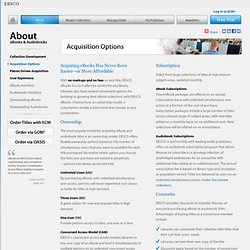
Libraries also have several convenient options for building or growing their eBook collections with EBSCO eBooks. Choose from an ownership model, a subscription model, a short-term loan model, or any combination. The most popular model for acquiring eBook and audiobook titles is an ownership model. EBSCO offers flexible ownership options based on the number of simultaneous users that you want to establish for each title purchased. No matter which option you choose, the titles you purchase are owned in perpetuity—patrons can always access the title. Unlimited Users (UU) By purchasing eBooks with unlimited simultaneous user access, patrons will never experience turn-aways or holds for titles in high demand. Patron Driven Acquisition. MyiLibrary. Expand your Library’s e-Content Potential Utilized by millions of end-users around the world, hundreds of public, academic and professional libraries have realized the benefits of accessing e-books from MyiLibrary.
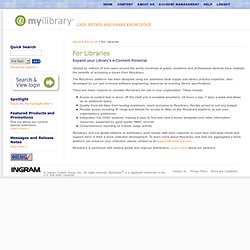
The MyiLibrary platform has been designed using our extensive book supply and library practice expertise, then developed by our own in-house software engineering resources to exacting library specifications. There are many reasons to consider MyiLibrary for use in your organization. These include: MyiLibrary and our global network of distributors work closely with each customer to meet their individual needs and support them in their e-book collection development. MyiLibrary is partnered with leading global and regional distributors. Patron Driven eBook Acquisition: Crab Legs vs. Spinach. The showpiece of many Chinese Buffet restaurants is the crab legs.
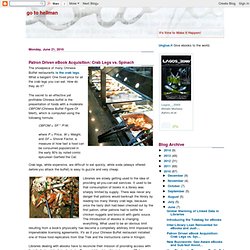
What a bargain! One fixed price for all the crab legs you can eat. How do they do it? The secret to an effective yet profitable Chinese buffet is the presentation of foods with a moderate CBFOM (Chinese Buffet Figure Of Merit), which is computed using the following formula: CBFOM = SF * P/W,where P = Price, W = Weight, and SF = Shovel Factor, a measure of how fast a food can be consumed popularized in the early 80's by noted comic epicurean Garfield the Cat. Crab legs, while expensive, are difficult to eat quickly, while soda (always offered before you attack the buffet) is easy to guzzle and very cheap. Patron_Driven_Acquisitions_.pdf. 11.pdf. Altering the collections landscape: an overview of patron-driven-acquisitions at Arizona State University Libraries.
1 Introduction In 2009 Arizona State University Libraries (ASU) adopted a patron-driven-acquisitions collection development plan.
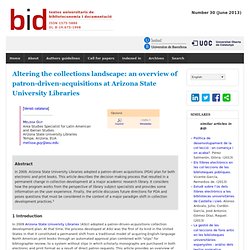
At that time, the process developed at ASU was the first of its kind in the United States in that it constituted a permanent shift from a traditional model of acquiring English-language North American print books through an automated approval plan combined with "slips" for bibliographer review, to a system without slips in which scholarly monographs are purchased in both electronic and print format as a result of direct patron requests. Chicago library patrons influence book purchases with new pilot program. The Chicago Public Library has adopted a Patron Driven Acquisition model for print books.
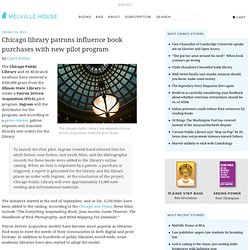
The Chicago Public Library and its 80 branch locations have received a $300,000 grant from the Illinois State Library to create a Patron Driven Acquisition (PDA) pilot program. Ingram will the distributor for the program, and according to a press release, patron requests will translate directly into orders for the library: To launch the PDA pilot, Ingram created hand-tailored lists for adult fiction, non-fiction, and youth titles, and the bibliographic records for these books were added to the library’s online catalog. When an item is requested by a patron, a purchase is triggered, a report is generated for the library, and the library places an order with Ingram. At the conclusion of the project, Chicago Public Library will own approximately 13,000 new reading and informational materials. The initiative started at the end of September, and so far, 5,250 titles have been added to the catalog.
Don’t Fear the Reader: Librarian versus Interlibrary Loan Patron-driven Acquisition of Print Books at an Academic Library by Relative Collecting Level and by Library of Congress Classes and Subclasses. The term “serials crisis” has come to be common shorthand for the runaway costs of many acadmic journals, particularly htose in the areas of science, technology, and medicine (STM) A White Paper for the UNC-Chapel Hill Scholarly Communications Convocation January, 2005 by Judith M.
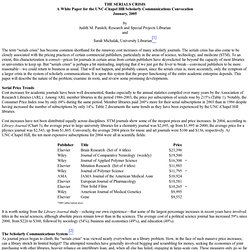
Panitch, Research and Special Projects Librarian and Sarah Michalak, University Librarian The term “serials crisis” has become common shorthand for the runaway cost increases of many scholarly journals. Serial Price Trends Cost increases for academic journals have been well documented, thanks especially to the annual statistics compiled over many years by the Association of Research Libraries (ARL). Cost increases have not been distributed equally across disciplines. It is worth noting from the Library Journal study—echoing our own experience—that some of the largest percentage increases in recent years have involved titles in the social sciences, although absolute prices remain lower than in the sciences.
What Patron-Driven Acquisition (PDA) Does and Doesn’t Mean: An FAQ. Image by thehoneybunny via Flickr Over the past couple of years I’ve been writing and presenting pretty relentlessly on the topic of patron-driven acquisition (PDA) in research libraries, arguing that in a predominantly online information environment it no longer fundamentally makes sense for most academic libraries to build large permanent collections based on librarians’ speculations about patrons’ future needs.
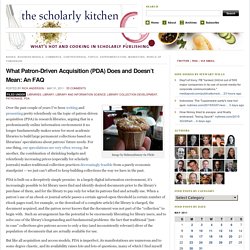
For one thing, our speculations are very often wrong; for another, the combination of shrinking budgets and relentlessly increasing prices (especially for scholarly journals) makes traditional collection practices decreasingly feasible from a purely economic standpoint — we just can’t afford to keep building collections the way we have in the past. Q: Isn’t all collection development patron-driven? After all, librarians have always striven to understand patrons’ needs and take them into account when selecting materials for the collection.